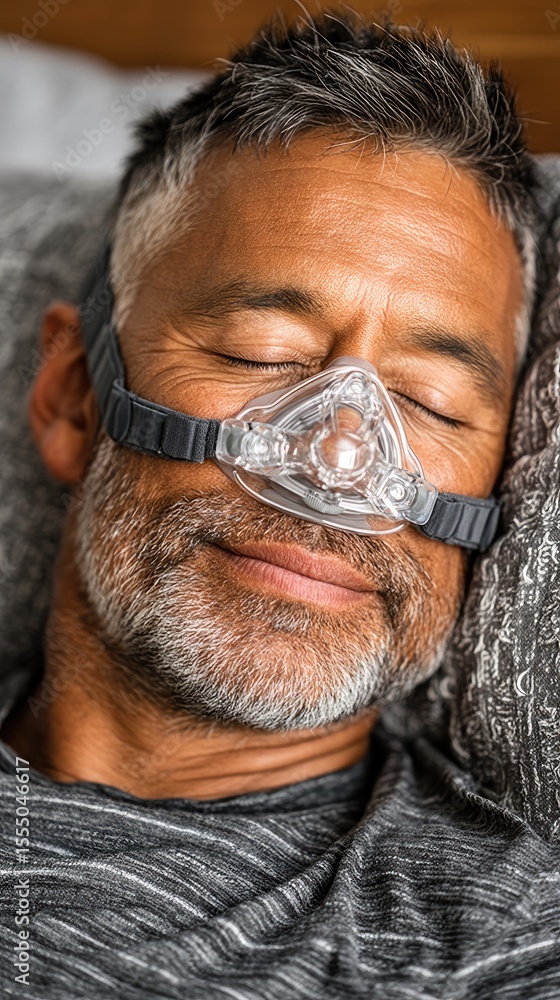What is sleep apnea?
Sleep apnea is a serious sleep disorder that causes pauses in breathing during sleep. These pauses can last several seconds and may occur dozens of times per night, disrupting your sleep (even if you don't fully wake up) and lowering oxygen levels. If untreated, it can lead to heart disease, stroke and other health problems.
There are three main types:
- Obstructive sleep apnea (OSA): The airway collapses or becomes blocked.
- Central sleep apnea (CSA): The brain doesn’t send the correct signals to the muscles that control breathing.
- Complex sleep apnea: A combination of OSA and CSA.
Sleep apnea symptoms
Common symptoms include:
- Loud snoring
- Gasping or choking during sleep
- Pauses in breathing noticed by another person
- Morning headaches
- Excessive daytime sleepiness
- Difficulty concentrating or memory problems
- Irritability or mood changes
Because some of the symptoms of sleep apnea occur while you’re sleeping, your bed partner may notice them first. You, or that person, may notice heavy snoring or long pauses in your breathing during sleep.
Even if you don’t remember waking up during the night, you may notice daytime sleepiness (such as falling asleep at work, while driving, or when talking), irritability, or fatigue. You may also experience morning headaches, forgetfulness, mood changes, and a decreased interest in sex.
What causes sleep apnea?
Causes vary depending on the type:
OSA: Your airway might be blocked by your tongue, tonsils, uvula, fatty tissue or by throat muscles that are too relaxed. Risk factors include obesity, enlarged tonsils, nasal congestion, alcohol use and sleeping on your back.
CSA: This type of sleep apnea is related to the function of the central nervous system. Either the brain doesn’t send the signal, or the signal gets interrupted. Brain signal disruptions, often linked to heart failure, stroke, or opioid use.
Complex: Combination of both airway obstruction and brain signal issues.
Men, people who are overweight, have endocrine disorders, neuromuscular conditions, heart or kidney failure, genetic syndromes, premature birth, and people who are older than 40 years of age are more likely to have sleep apnea. However, it can affect anyone at any age, even children.
How is sleep apnea diagnosed?
Your doctor can diagnose sleep apnea. Your doctor will:
- Ask about your bedtime and sleep habits, symptoms and medical history
- Examine your mouth, throat, and neck
- Recommend a sleep study (polysomnography) at a sleep center or a home sleep apnea test to measure breathing patterns, oxygen levels, and brain activity during sleep
Can sleep apnea be prevented or avoided?
There are things you can do to prevent sleep apnea. You may lower your risk by:
- Maintaining a healthy weight
- Avoiding alcohol, especially before bed
- Treating nasal congestion and allergies
- Sleeping on your side instead of your back
- Getting regular physical activity
While not all cases can be prevented, managing risk factors can reduce severity.
Sleep apnea treatment
Certain dental devices can be used to treat mild cases of obstructive sleep apnea. These devices move your jaw forward to make breathing easier.
A common treatment for sleep apnea is called “continuous positive airway pressure,” or CPAP. In this treatment, you wear a special mask over your nose (and sometimes mouth, too) while you are sleeping. The mask will keep your airway open by adding pressure to the air you breathe. It helps most people who have sleep apnea.
In very few cases, surgery is necessary to remove tonsils or extra tissue from the throat.
Treatment depends on the type and severity of your sleep apnea:
Lifestyle changes
- Weight loss
- Changing sleep position
- Adding an ergonomic pillow for neck support
- Avoiding alcohol and sedatives before bed
Devices and therapies

- CPAP (continuous positive airway pressure) machine to keep the airway open by adding pressure to the air you breathe
- Oral appliances to reposition the jaw or tongue
- Adaptive ventilation devices for certain central sleep apnea cases
Surgery
- Removing tissue blocking the airway
- Correcting structural problems in the nose or throat
New medication option (FDA-approved 2024)
In December 2024, the FDA approved Zepbound (tirzepatide) for treating moderate to severe obstructive sleep apnea in adults with obesity. This is the first medication specifically approved for OSA. It works by promoting weight loss, which can reduce airway blockage during sleep. Zepbound may be an option for patients who meet certain medical criteria and should be prescribed under a doctor’s supervision.
What can I do to improve sleep apnea symptoms?
- Use your CPAP or prescribed device every night
- Keep a regular sleep schedule
- Avoid heavy meals, caffeine, and alcohol close to bedtime
- Stay active during the day
Living with sleep apnea
With proper treatment, most people manage their symptoms well and reduce the risk of complications like heart disease, high blood pressure, diabetes, and stroke. Untreated sleep apnea can increase the risk of accidents, mood disorders, and memory problems.
Questions to ask your doctor
- Do I need a sleep study?
- Which treatment is best for my type of sleep apnea?
- Could I benefit from CPAP, an oral appliance, or medication like Zepbound?
- How can I make CPAP use more comfortable?
- What lifestyle changes will help improve my symptoms?
ADVERTISEMENT
ADVERTISEMENT




